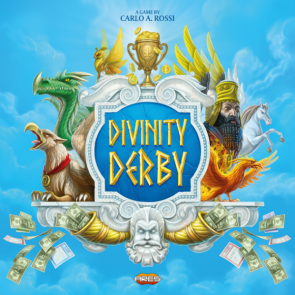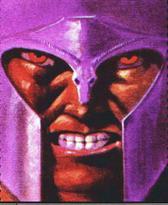Flight of the Round Table
*Dials Phone*
“Hello?”
“Hey, I got this new game we should check out, I think you will dig it.”
“Cool. What's it called”
“Divinity Derby – It's about mythological creatures racing”
“Awesome. Do I need to bring anything? Chips? Beer?”
“Well, do you happen to have a round gaming table that will seat six?”
* Click *
“Hello? Hello?”
Welcome to Discount Dive where I search the discount bins for cheap and interesting games. Of course, the above conversation is made up (no one actually calls anyone anymore) but the situation is real. Divinity Derby from Ares Games is a racing/betting title that uses a Shared Hand Mechanism that really benefits from using a round gaming table because each player will be sharing two trays of cards. You can do it at a traditional square table (as I usually do) but it involves plenty of sliding trays back and forth and you won't always have the view of all the cards you can play while another player is looking at them.
As I mentioned, the game is race and features creatures from mythology blazing around a circular track. The contest includes a Dragon, Griffin, Pegasus, Phoenix, ummm... Fez and Mothra. I'm sure the last two have actual names but we just call them Fez and Mothra. Players take the role of a god who is betting upon the competition. You'll notice I said god because there are literally no goddesses included in the choice of characters, which is odd in my opinion because there has never been a shortage of goddesses in folklore.
After the cards are dealt out and put on trays equal to the number of gods, you look at your “shared” trays. You will be playing one card from each tray on your turn and each card tells you how many spaces the creature can move. Each card has two numbers: The top number is higher and the bottom number lower. You will be playing one high number and one low number per turn. But before the contest begins, each player will be making bets, mostly based on what cards they are “sharing” with a other players and what the numbers are on them. In turn, each player takes a creature token and places in on a face-down bet card. You have no idea what the other gods are betting on, only that they are betting it about a specific creature. You see, the cards are worth a variety of points depending on how specific they are. One is “Finish in first place or Second Place” another is “Finish Last or next to last.” Did the player across the table take the Pegasus token and place a bet using it? Hmmm, maybe they have a ton of Pegasus cards between their two racks of cards? Or maybe they have only one or two and are betting the winged equestrian is going to finish last? After every player has placed their initial bet, a second bet is placed by everyone. But there are a limited number of each creature token, if they have all been taken, you won't have a chance to bet on that creature in this race...and you can only bet on each beast once per race.
After the betting phase, the first of three races begins: Each god plays two cards, as I described earlier but they also have the ability to “cheat” if the card includes the option. For instance: the top number on a Griffin card may be a 3 but is followed by +2. If you choose to cheat, you can move the Griffin a total of 5 spaces but, instead of discarding it as you normally would, you add it to the Zeus's Judgment deck. At the end of the race, all the cards used to “cheat” will be shuffled with four “blank” Zeus cards and two will be drawn. If the cheating creatures card is drawn, he is disqualified. If a blank is drawn, it is as if Zeus had a few too many ales and didn't notice. And, yes, there are betting cards that include the disqualified option.
Half way through the race, a third round of betting takes place, with each player taking into account the current standings of the creatures and how they think it will all fluff out in the end. Since you are playing a shared hand, which creature you thought would be a lock for first place can suddenly change. Like when a god plays a creature card for the lower number and, instead of moving 3 spaces as you anticipated, it suddenly spins in place because they played him as a zero movement.
In all, it is a raucous good time, with good natured ribbing and under breath cursing as the fortunes of the creatures ebbs and flows. Equal measures of imperfect information and the luck of the disqualification deck means you can never quite know how a race will turn out. But there is plenty of strategy in when you should place what type of bet (you only use each bet card once per game). I will say that at the end of the VERY first game we had a total points tie between two gods for first place. We laughed and smiled and looked in the rulebook and found...nothing. Seriously? At no point in time did someone think maybe, just possibly, there would be tie? And maybe we should address that in the rule book, just in case?
Supporting 3 to 6 players, it is fairly easy to explain and grasp, making a great party game with a layer of strategy for those looking under the hood. I snagged this for less than $20.00 in the discount bin and have gotten more than my money's worth out of this great game. Heck, I almost didn't even feel bad when I spilled my beer on it last week. The smell of hops is the true judge of a party game isn't it?
 Games
Games How to resolve AdBlock issue?
How to resolve AdBlock issue? 




















